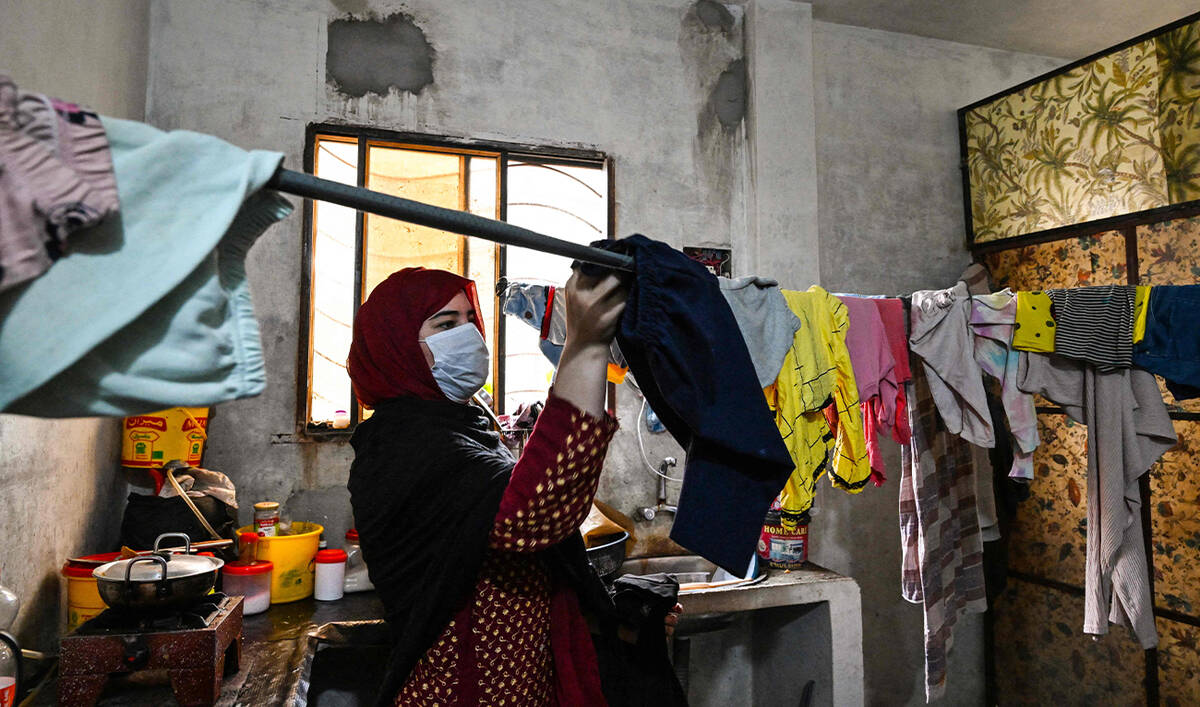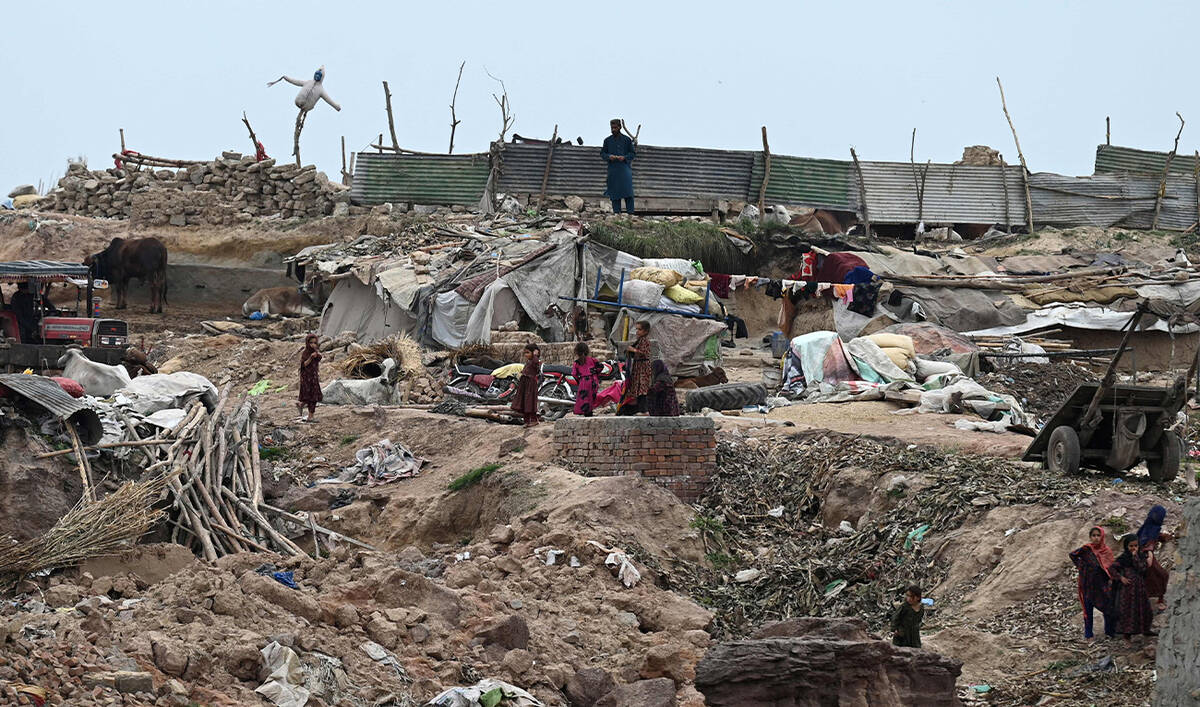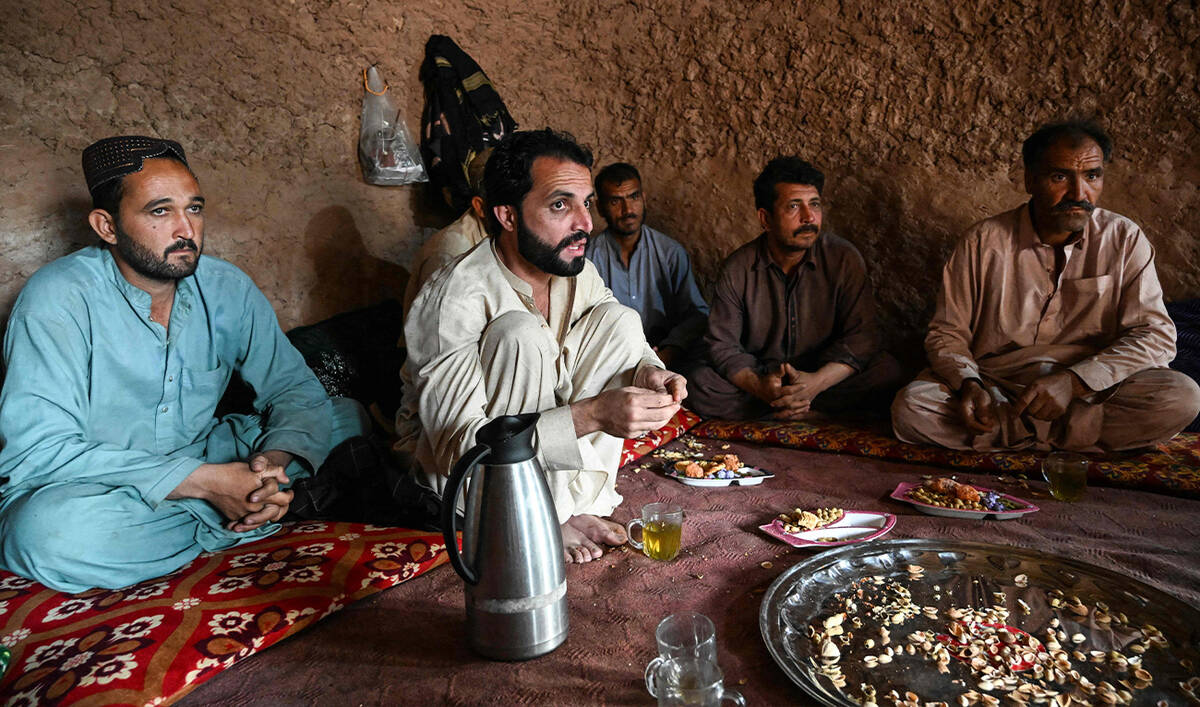PESHAWAR: Protest organizers leading a sit-in in Pakistan’s northwestern Bannu district said on Tuesday they opposed a proposed military operation in the region, demanding that a spike in militant attacks be tackled by empowering and better equipping civilian agencies like the police and counter-terrorism department (CTD).
Pakistan’s federal government last month announced a new campaign to counter a fresh surge in militancy in areas along the border with Afghanistan. Major opposition parties have opposed the operation and in Bannu — where eight soldiers were killed in a suicide bombing last week — thousands of people have held rallies to call on authorities to ensure peace and security.
On Friday, at least two persons were killed and more than 20 injured after gunfire triggered a stampede at the rally in the northwestern Pakistani city, prompting a sit-in that continues to date.
One of the main demands of the protesters is that federal and provincial authorities not launch any new military offensive in the area as past military campaigns have led to the displacement of hundreds of thousands of residents.
“We can’t accept any further military operations because we have already witnessed results of operations in South and North Waziristan tribal districts, which left families homeless and houses destroyed,” Nasir Khan Bangash, president of the 45-member Bannu Aman Jirga and a senior member of the Bannu Chambers of Commerce, told Arab News on Tuesday.
“Our viewpoint is that maintaining law and order is the job of police and CTD, and they should carry out any search operations to detain any wanted person or clear the suspected area.”
Bangash added that the military’s job was the “defense” of the country’s borders, while ensuring peace and internal security was the constitutionally mandated duty of the police and CTD.
“Against the backdrop of lawlessness, police and CTD forces should be equipped to deal with security issues of the district because both the forces are raised for the purpose,” he added.
The Pakistan army was able to effectively dismantle the Pakistani Taliban, or TTP, and kill most of its top leadership in a string of military operations from 2014 onwards in the country’s tribal areas, driving most of the fighters across the border into Afghanistan, where Islamabad says they have regrouped. Kabul denies this.
Islamabad says the new surge in violence is because Afghanistan’s Taliban rulers are not doing enough against militants using its soil to launch attacks on Pakistan. Kabul says rising violence in Pakistan is a domestic issue and it does not allow militants to operate on its soil.
“COMPREHENSIVE CAMPAIGN”
Past military operations have displaced hundreds of thousands of people and destroyed countless lives and livelihoods in Pakistan’s northwestern Khyber Pakhtunkhwa province, sparking a civil rights movement by ethnic Pashtuns.
Fears of more displacement have been raised by the announcement of the new Azm-e-Istehkam operation but in a press conference this week, Pakistani military spokesman Lt Gen Ahmed Sharif Chaudhry dispelled the fears, saying the campaign was not meant to be a full-scale military operation.
“This is a comprehensive campaign against terrorism, which won’t just root out terrorism but which will lift up all of society,” he said at a press conference.
Still, Bangash insisted the people of the Khyber Pakhtunkhwa province did not want any type of operation.
“Our main demand is peace and stability in the Bannu region, which is key to normal social life and enhanced business activities,” he said.
The group had already held “constructive” talks with KP Chief Minister Ali Amin Gandapur, Bangash said, and now the provincial apex committee, which comprises civilian leaders and military commanders in the province, would meet to discuss the issue on Thursday.
However, he said the sit-in, which entered its fourth day on Tuesday, would continue and any agreement reached with the government would have to be approved by the protesters.
Sit-in continues in northwest Pakistan over militancy surge, protesters reject army operation
https://arab.news/5mhgu
Sit-in continues in northwest Pakistan over militancy surge, protesters reject army operation

- Pakistan government has announced new counter-terrorism campaign in areas along the border with Afghanistan
- Past armed operations against militants have displaced hundreds of thousands of people and destroyed livelihoods
Pakistan hands over 35 tons of humanitarian aid to earthquake-hit Myanmar

- The 7.7-magnitude quake hit a wide swath of the country, causing significant damage to six regions and states including the capital Naypyitaw
- It has worsened an already dire humanitarian crisis triggered by the country’s civil war that internally displaced more than 3 million people
ISLAMABAD: Pakistan has handed over 35 tons of emergency relief aid to Myanmar for its earthquake-affected people, Pakistani state media reported on Sunday, as death toll from last week’s massive earthquake in Myanmar neared to 3,500.
The 7.7-magnitude quake hit a wide swath of the country, causing significant damage to six regions and states including the capital Naypyitaw. The earthquake left many areas without power, telephone or cell connections and damaged roads and bridges, making the full extent of the devastation hard to assess.
It also worsened an already dire humanitarian crisis triggered by the country’s civil war that has internally displaced more than 3 million people and left nearly 20 million in need, according to the United Nations.
Pakistan had dispatched the second consignment of humanitarian aid through an air cargo flight from Islamabad to Yangon, Myanmar, according to Pakistan’s Press Information Department (PID).
“Pakistan’s Ambassador to Myanmar Imran Haider officially gave the consignment to Chief Minister of Yangon Region at Yangon International Airport,” the Radio Pakistan broadcaster reported.
“This shipment, comprising 35 tons of goods, brings the total relief assistance dispatched to Myanmar after the recent earthquake to 70 tons.”
The development came as rain compounded misery and presented new hurdles for relief efforts in Myanmar on Sunday. With people either having lost their homes entirely or reluctant to spend time in cracked and unstable structures, many residents have been sleeping outside in tents.
United Nations aid chief Tom Fletcher said in a video filmed in Mandalay, Myanmar’s second largest city, that food, water, and power repairs were needed urgently.
Many people in the area are still without shelter, he said, describing the scale of damage in the city as “epic.”
“We need to get tents and hope to survivors as they rebuild their shattered lives,” Fletcher wrote on X.
Pakistan announces star-studded commentary panel for PSL 10th edition

- Former England Test captain Alastair Cook is set to make his PSL debut behind the mic this season
- The PSL 10th edition will also feature a full-match broadcast in Urdu commentary for the first time
ISLAMABAD: The Pakistan Cricket Board on Sunday announced a star-studded commentary panel for the 10th edition of the Pakistan Super League (PSL) Twenty-20 tournament, with former England Test captain Alastair Cook set to make his PSL debut behind the mic.
The six-team tournament is scheduled to commence from April 11 at the Rawalpindi Cricket Stadium and will conclude on May 18, with the final taking place at the Qaddafi Stadium in Lahore.
The tournament will feature 34 matches in Karachi, Lahore, Multan and Rawalpindi.
“Cook will be joined by former MCC President Mark Nicholas – a renowned voice in cricket commentary since retiring from competitive cricket in 1995,” the PCB said.
“Joining Cook and Nicholas are fellow countrymen Dominic Cork and Mark Butcher, while South Africa’s Jean-Paul Duminy and Mike Haysman will also be part of the panel.”
From Bangladesh, it will be Athar Ali Khan, and he will be joined by New Zealand’s former Test cricketer Martin Guptill. Australia’s two-time ICC Women’s World Cup winner Lisa Sthalekar will also lend her voice to the tournament.
Commentators from Pakistan include four former Test captains, Aamir Sohail, Ramiz Raja, Waqar Younis and Wasim Akram. They will be joined by former Test cricketer Bazid Khan, former Pakistan women’s team captain Urooj Mumtaz and cricket analyst Sikander Bakht.
In a historic move, PSL-10 will also feature a full-match broadcast in Urdu commentary for the first time.
“The Urdu commentary panel includes Ali Younis, Aqeel Samar*, Marina Iqbal*, Salman Butt and Tariq Saeed, who will be joined by the above Pakistan’s commentators for selected segments,” the PCB said.
Erin Holland and Zainab Abbas will be the presenters during the league matches.
“We are excited to welcome a star-studded commentary team, featuring some of the most iconic names in the cricketing world — including legendary former Test captains and top-tier broadcasters. Their involvement not only enhances the quality of our coverage but also highlights the global stature of the HBL PSL,” PSL Chief Executive Officer Salman Naseer said.
“This year, for the first time in HBL PSL history, we will be broadcasting a full match entirely in Urdu commentary – a move that brings us even closer to our passionate fanbase across Pakistan. We are confident that the combination of iconic voices and fresh innovations will enhance the viewing experience for fans at home and around the world.”
Pakistan says killed eight militants infiltrating its border with Afghanistan

- The Pakistani Taliban militants were trying to infiltrate the border in North Waziristan district of Pakistan’s Khyber Pakhtunkhwa province
- Islamabad has frequently blamed the surge in militancy in its western provinces of KP and Balochistan on Afghanistan, Kabul denies the charge
ISLAMABAD: Pakistani security forces have killed eight Pakistani Taliban militants who were attempting to infiltrate the country’s border with Afghanistan in the northwestern Khyber Pakhtunkhwa province, the Pakistani military said on Sunday.
Pakistan has struggled to contain a surge in militancy in the country, particularly in KP, since a fragile truce between the Pakistani Taliban, or the Tehreek-e-Taliban Pakistan (TTP), and Islamabad broke down in November 2022.
The TTP and other militant groups have frequently targeted security forces convoys and check-posts, besides targeted killings and kidnappings of law enforcers and government officials in recent months.
In the latest incident, security forces had an intense exchange of fire with the group of militants who attempted to infiltrate the border in KP’s North Waziristan district, according to the Inter-Services Public Relations (ISPR), the Pakistani military’s media wing.
“Sanitization operation is being conducted to eliminate any other Kharji [TTP militant] found in the area,” the ISPR said in a statement.
The North Waziristan district, which borders Afghanistan, had been a stronghold of the TTP before successive military operations drove the militants out of the region more than a decade ago. Pakistan says TTP fighters have regrouped in the restive region in recent years.
Islamabad has frequently blamed the surge in militancy in its western provinces of KP and Balochistan on Afghanistan, accusing Kabul of sheltering and supporting militant groups that launch cross-border attacks. Afghan officials deny involvement and insist that Pakistan’s security issues are an internal matter of Islamabad.
“Pakistan has consistently been asking interim Afghan government to ensure effective border management on their side of the border,” the ISPR said.
“Interim Afghan government is expected to fulfil its obligations and deny the use of Afghan soil by Khwarij for perpetuating acts of terrorism against Pakistan.”
Pakistan seeks ‘comprehensive’ partnership with Russia in energy, agriculture and IT sectors

- Pakistan and Russia, once Cold War rivals, have strengthened ties in recent years through increased dialogue and trade cooperation
- Senate Chairman Gilani expresses Pakistan’s support for Russia’s role in promoting regional stability, multipolar global governance
ISLAMABAD: Pakistan seeks a “comprehensive” partnership with Russian in energy, agriculture, information technology (IT) and other sectors, Pakistan’s Senate Secretariat said on Sunday, citing Senate Chairman Yousuf Raza Gilani.
The statement followed Gilani’s meeting with Valentina Matviyenko, chairwoman of the Federation Council of the Russian Federation, on the sidelines of the 150th Inter-Parliamentary Union (IPU) Assembly in Tashkent.
Gilani highlighted the shared aspirations of both nations for peace, security and multipolarity in global affairs, and emphasized the increasingly broad-based cooperation across various sectors and multilateral platforms.
“Both sides discussed diversifying economic ties in areas such as energy, agriculture, pharmaceuticals, and IT. Chairman Gilani advocated for the establishment of banking channels and improved connectivity under regional frameworks,” the Senate Secretariat said in a statement.
“Chairman Gilani concluded by reaffirming Pakistan’s readiness to work with Russia toward a comprehensive, forward-looking partnership and extended an invitation for future parliamentary exchanges in Islamabad.”
Pakistan and Russia, once Cold War rivals, have strengthened ties in recent years through increased dialogue and trade. In 2023, Islamabad began purchasing discounted Russian crude oil banned from European markets due to Russia’s war in Ukraine, and also received its first shipment of liquefied petroleum gas from Moscow.
In December last year, Russia and Pakistan held intergovernmental meetings in Moscow and discussed cooperation on oil and gas offshore exploration and refining, according to a Reuters news agency report. Russian Ambassador to Pakistan Albert P. Khorev this year announced cooperation with Pakistan in the energy and industrial sectors, including the modernization of a state-owned steel mill.
Gilani expressed Pakistan’s support for Russia’s role in promoting regional stability and multipolar global governance, according to the Senate Secretariat.
“Both sides emphasized the importance of coordinated efforts in forums like the SCO (Shanghai Cooperation Organization) and UN (United Nations), particularly regarding climate action, food security, and counter-narcotics,” it added.
‘No one to return to’: Afghans fear Pakistan deportation

- Islamabad announced at the start of March that 800,000 Afghan Citizen Cards would be canceled
- The deportation program has already forced 800,000 undocumented Afghans across the border
Rawalpindi: Benazir Raufi stands alone in her restaurant, her staff and customers too afraid to visit after Pakistan’s government announced it was canceling the residence permits of hundreds of thousands of Afghans.
Islamabad announced at the start of March that 800,000 Afghan Citizen Cards (ACC) would be canceled — the second phase of a deportation program which has already forced 800,000 undocumented Afghans across the border.
“If I’m deported, it will destroy me. Either my heart will stop, or I’ll take my own life,” 45-year-old Raufi, who was 13 years old when her family fled civil war in Afghanistan in the 1990s, told AFP.
“Pakistan gave us our smile and now those smiles are being taken away.”

Ten Afghan women who worked for her have refused to leave home after the restaurant in Rawalpindi was raided by police — facing deportation to a country where women are banned from studying, certain jobs and visiting some public places like parks.
“I have no one to return to. The Taliban won’t accept us,” Raufi added, her voice cracking.
The government’s deadline for ACC holders to leave voluntarily has been pushed back to April, but harassment by authorities has been underway for months, according to activists.
Those born in Pakistan, married to Pakistanis, or living for decades in the country are among those to have their government residence permits canceled.
The deportation campaign comes as political ties between the neighboring governments have soured over Pakistan’s rapidly deteriorating security situation along the border.
Last year was the deadliest year in almost a decade in Pakistan, with more than 1,600 people killed in attacks — nearly half of them security forces personnel — according to the Islamabad-based Center for Research and Security Studies.
Pakistan accuses the Taliban government of failing to root out militants sheltering on Afghan soil, a charge the Taliban government denies.
The Taliban government has repeatedly called for the “dignified” return of Afghans to their country, with Prime Minister Hassan Akhund urging countries hosting Afghans not to force them out.

“I have freedom (in Pakistan) — I can visit the park, and my daughter can go to school,” Dua Safay, who fled when the Taliban government returned to power in 2021.
“There’s no future for me or my daughter in Afghanistan,” added Safay, whose real name has been changed.
Some 600,000 Afghans have crossed the border into Pakistan since the Taliban government implemented their austere version of Islamic law.
“They will be sent back to a country where conditions are extremely harsh, especially for women and children,” according to Moniza Kakar, a Pakistan-based human rights lawyer.
“These people fled to escape persecution. Forcing them back into that fire is a violation of international law.”
Millions of Afghans have traveled to Pakistan over the past four decades, fleeing successive conflicts including the Soviet invasion, a civil war and the post-9/11 US-led occupation.
The ethnic Pashtun belt of Khyber Pakhtunkhwa which borders Afghanistan shares close cultural and linguistic ties with Afghan Pashtuns.

Around 1.3 million Afghans with resident cards issued by the UN Refugee Agency (UNHCR) are allowed to remain in the country but have been banned from the cities of Islamabad and Rawalpindi.
“Over 1,000 people have been moved to detention centers in the past three to four days, while thousands are leaving voluntarily all over Pakistan,” Kakar added.
Many families fear being mistreated or extorted for money by the authorities if they are detained, or of being separated from relatives.
“If I have to go, I’ll go in tears, with a broken heart,” said 43-year-old Naimatullah, who was born in Pakistan and has never been to Afghanistan.
“They (people) won’t even see me as an Afghan — they’ll call me Pakistani. I am a nobody.”
After the deadline, Samiullah, who was born in an Afghan refugee camp in Pakistan and is married to a Pakistani woman, will be considered an illegal foreigner.
“My wife will not be able to go with me, my daughters are from here. It is a constant struggle. I can’t get caught,” the 29-year-old told AFP.

Tens of thousands of Afghans living in Pakistan who are waiting to be relocated to Western nations also fear being deported.
Most are advised by Western nations to cross into Pakistan where their asylum claims take months to be processed.
Among them is Samia Hamza, a 31-year-old women’s rights activist and mother of four, currently in the northwestern city of Peshawar.
“They gave us a support letter but the Pakistani police does not recognize it,” she told AFP.
“We need to stay one more month in Pakistan, then we will receive our visa to Brazil and leave.”










